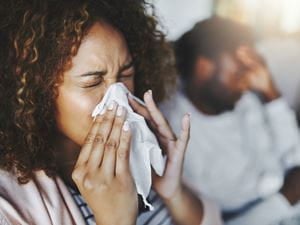
Cold and flu season is here. As the months get colder and people are indoors more often, these respiratory illnesses typically spread in close quarters. According to the Centers for Disease Control and Prevention, flu activity usually increases in October, peaking between December and January.
In addition to the flu, several other respiratory viruses circulate, like RSV and rhinovirus, causing cold-like symptoms and of course, COVID is still a threat as well. Physicians aren’t immune to cold and flu season, but they know better than anyone how to protect themselves. Here are some tips on staying healthy during the cold and flu season.
Delay or skip the flu shot.
According to Dr. Marie-Louise Landry, a professor of laboratory medicine at Yale, delaying or skipping the flu vaccine can put you at risk of getting sick from flu-related complications. She said she’s contracted the flu multiple times and was very sick each time. However, since receiving the flu vaccination, she’s only had one breakthrough flu infection, and it was brief and mild in comparison.
With a few rare exceptions, everyone six months and older is advised to get their flu shot every season. You’ll want to ensure that you get the vaccine as soon as it’s available in your community so your body has time to build up defenses against the virus.
Go to school or work if you’re sick.
Most experts would suggest avoiding work if you’re sick with the cold or flu. We each have a responsibility to each other, and when we go to school or work while sick, we place those around us at risk. Since colds and the flu spread from an infected person through respiratory droplets and surfaces, it’s best to stay home if you’re sick to reduce the risk of transmission. According to the CDC, even if you’re experiencing no symptoms but tested positive for the flu, you can still spread the virus to others.
Go without a mask if you’re sick.
In some situations, you may have to go out in public while you’re sick. Dr. John Swartzberg, a clinical professor at the University of California, Berkley’s School of Public Health, said he wouldn’t leave his house without a good mask on, like a KN95 or N95 mask. He added that anyone with a respiratory illness should wear a mask when they’re in public places, outdoors or indoors, if they’re next to others. Doing so will significantly reduce the risk of respiratory droplets that can be released into the air when you sneeze or cough while sick.
Skip hand-washing.
Practicing poor hand-washing hygiene can be a risk of contracting the common cold or flu. According to Dr. Swartzberg, you should commit to keeping your hands clean via frequent hand-washing. He said when our hands get contaminated after touching a surface where the virus may be present, touching our nose or eyes with those contaminated fingers can expose us, making us sick. If you’re on the go and can’t wash your hands, you can also use alcohol-based sanitizer as a temporary disinfectant until you can wash your hands.
Stick to a regular, busy routine.
It’s essential to get enough rest while you’re sick. Often, we try to push through and keep going, regardless of how we feel physically. The body gives signals and signs to rest, but we continue to go, which can negatively affect our health. The good news is that sleep can help you recover more quickly from the flu or a cold, as symptoms can last up to two weeks. Not getting enough sleep is linked to increased inflammation and a diminished immune response, prolonging the time needed to recover from your illness. By making sure you prioritize healthy habits, you’ll have the best chance of staying illness-free during cold and flu season.
Avoid cleaning common surfaces regularly.
Everyone in your family picks up germs during the day, and some of those germs find their way into your home. Even if nobody is sick, it’s essential to keep surfaces clean. Using disinfecting wipes and wiping down surfaces helps to reduce germs so everyone stays healthy.
Not prioritizing nutrition.
Ensure that your family eats well-balanced, wholesome meals that not only promote proper development and growth but it also strengthens their immune system. All of the body’s cells require adequate nutrition to function correctly. Eating various nutritious foods ensures that your children get crucial nutrients the immune system needs to stay strong. To boost your intake of infection-fighting antioxidants, try to have them fill at least half of their plates with various colorful fruits and vegetables.
Sharing food or drinks.
One of the fastest ways to spread germs is by sharing drinks or food around the table. It may be tempting to take a sip of someone’s drink or share a plate of food, but that’s how germs quickly spread. Your family can avoid this by being extra careful about using individual plates, cups and utensils at mealtime during cold and flu season.
To prevent the sharing of germs among loved ones, try using single-use straws instead of drinking straight from the cup when you’re out to eat. The same mindset can be applied to household items: don’t use sheets someone has already slept on, share towels, and clean common surfaces frequently. You should also avoid using shared workout equipment unless it’s been cleaned thoroughly.The cold and flu season is always a concern and continues to pose an even greater danger. With a significant focus on COVID-19, it’s essential to remember that cold and flu season still exists. Keeping your family healthy is more important than ever. Both the cold and flu are contagious, and as more people gather indoors, the potential for getting one or both of these illnesses increases. Some COVID-19, cold, and flu symptoms overlap, making things more complicated. Hopefully, these tips will keep you and everyone in your household safe from the cold or flu.

